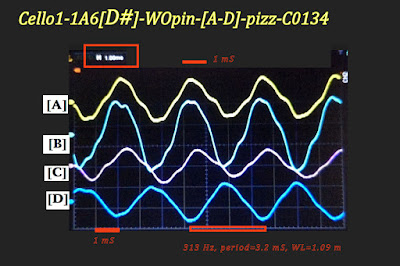[ 02/08/2023 ] Labels: 77b.Resonance-II
D# tone is very special for cellos. The precise boundary frequency depends on the dimensions of cellos. D#(156Hz) can take a maximum length single-8shape orbit in cello body, and at D#(313Hz) also take double 1/2-size-8shape sets. This fact causes another influence on cello resonance. Below the D#(313Hz) frequency, the resonance orbits are fully contact to bouts/body inside the cello, so the resonance behaves with whole cello body(as omnidirectionally). But beyond the D#(313Hz), shorter orbits get free and allowed disparity as for location, then the resonance gets phase difference and the sound gets directionality. See: [C][D]、(g)(h).
チェロにとって D#(-楽器のティメンションによって若干異なる-)は特殊なトーンである。D#(156Hz)は単一8の字形の最大軌道であり、313HzのD#は 1/2サイズの8の字が2セットぴったり収まる位置である。チェロを演奏する人は、D#(313Hz)付近でロングトーンをすると急に響きが変化する境界があるのに気づくだろう。つまり、D#(313Hz)以下では 8の字形軌道が常に筐体のどこかの壁に接しており自由度の少ない形で共鳴していたが、ここを境として一部 自由に移動できるようになる。その結果 上下左右どちらかに偏った共鳴エリアをとれるようになり、筺体内に方向性を持った共鳴が見られるようになる。音に方向性が出てくる。測定点[C][D]、(g)(h)で逆相の振動となっている。


_pz_221129_C0088-1%E2%97%8F.jpg)

_pz_221129_C0088-2%E2%97%8F.jpg)
_pz_221129_C0084-1.jpg)
